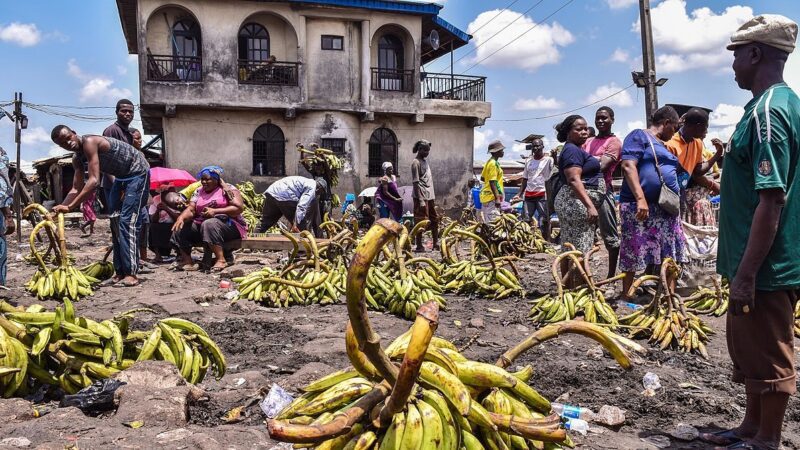Breaking News
Outcry in Gbagi Market as Traders Decry ‘Eviction by Modernisation’ Over Costly New Shops
“Allocations were not made secretly or overnight, but through a transparent and documented process coordinated by the leadership of the traders and relevant government departments,” he said, adding that traders were informed of the shop prices in advance and given the option to opt out.

The clatter of hammers and roar of trucks now echo through the once-bustling Gbagi Market in Ibadan, where redevelopment efforts by the Oyo State Government have sparked tension, fear, and accusations of silent eviction.
Widely regarded as Ibadan’s commercial heartbeat and one of Nigeria’s largest fabric markets, Gbagi Market—also known as Oja Gbagi—has long been a hub for textiles, electronics, foodstuffs, and traditional crafts. But a government-led “modernisation” drive has led to the demolition of low-cost stalls and the construction of high-priced modern shops that many traders say they simply cannot afford.
To the government, it is infrastructure renewal. To many traders, it’s forced displacement.
Displacement and Desperation
For 35-year-old Ahmed Alasepe, the redevelopment ended his decade-long business. Once paying just N100,000 a year for a clothing stall, Alasepe now tills the soil in distant Eruwa.
“I was in Gbagi Market before, selling clothes. Everything was moving fine until they came,” he recalled. “The government contractors told us our shops would be demolished and replaced. They asked me to pay N2.5 million. I just couldn’t afford it.”
Alasepe is among scores of traders pushed out by soaring shop prices. The new modern stalls, many say, are tailored for the rich.
Wasiu Olawuyi, another long-time trader, lost his container shop. “I was paying N25,000 for a big container shop,” he said. “Now they built this smaller 5×10 shop and told me to pay N1.6 million. My entire goods aren’t worth N500,000. How do they expect me to pay?”
His frustration turned to resentment: “It was we, the poor, who voted Governor Seyi Makinde into office. Now he is pushing us out for the rich to take over.”
Moyosore, a food trader, said she was forced to take a N5 million loan with a N1 million interest to secure a shop she once rented for just N100,000.
“This is wickedness,” she said tearfully. “After the construction, the shop is even smaller. But if I didn’t pay, they said they would give it to someone else. I had no choice.”
Rising Tension and Protest
The redevelopment has upended daily life in the market, with old stalls being demolished and what used to be car parks now occupied by new shop structures. Traders say the new shop prices range from N1.6 million to as high as N7.5 million, compared to former rents of N20,000–N30,000.
Last Monday, frustrations boiled over into protest. Elderly traders, apprentices, and market women held placards that read: “Governor Seyi Makinde, please come to our rescue” and “Save us from destroyers, they have taken the car park!”
One woman, who declined to give her name, warned of safety hazards. “We were told there won’t be car parks anymore. They are building everywhere. Now they say cars should park along the expressway. What if accidents happen?”
Market in Disarray
A visit by Saturday PUNCH to the market revealed chaotic scenes. In the Rounda and Ita Wewe sections, traders were cramped into tight corners. Walkways were blocked by construction, and customers’ vehicles now clog the expressways.
Many displaced traders now sell under umbrellas at the roadside.
“I couldn’t afford the new shop,” said Mama Sukurat, a foodstuff seller. “I am here because we must feed.”
Another trader, Toun Adewuyi, gestured at a busy area and said, “That small section where those cars are parked, they told us they will build there too. They said we should be parking outside.”
Long-time market stakeholder Mr. Adeoti added, “A market without car parks is like a house without doors. It endangers everyone.”
He warned that emergency response would be nearly impossible due to the congestion.
“Fire trucks or ambulances can’t access the inner sections anymore. There’s no proper planning.”
Others raised concerns about the structural integrity of the new shops.
“They didn’t dig any foundation, and that was how that shop was built,” said Taoreed, pointing to a new row of shops. “They’ve told us to move the vehicles—more buildings are coming.”
Government’s Response and Denial
The Oyo State Government has defended the redevelopment, insisting the project is part of a broader plan to modernise public infrastructure.
In a statement issued last Wednesday by the Commissioner for Investment, Trade, Cooperatives and Industry, Adeniyi Adebisi, the government denied converting any car park into shop space or demanding secret payments from traders.
“No part of the main designated car park has been taken over or eliminated. The new shops are not situated in the core vehicle parking zone,” the statement read.
Adebisi also claimed the allocation of shops was transparent and documented.
“Allocations were not made secretly or overnight, but through a transparent and documented process coordinated by the leadership of the traders and relevant government departments,” he said, adding that traders were informed of the shop prices in advance and given the option to opt out.
“There is no evidence of ‘coerced’ payments as wrongly alleged,” the commissioner insisted.
However, when Saturday PUNCH sought further clarification on rising shop costs, lack of foundations, and the loss of parking spaces, access to the commissioner was denied. A press officer promised an official response, which had not been received at the time of filing this report.










